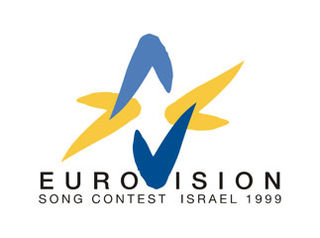
The Eurovision Song Contest 2000 was the 45th edition of the Eurovision Song Contest. It took place in Stockholm, Sweden, following the country's victory at the 1999 contest with the song "Take Me to Your Heaven" by Charlotte Nilsson. Organised by the European Broadcasting Union (EBU) and host broadcaster Sveriges Television (SVT), the contest was held at the Globe Arena on 13 May 2000. The contest was presented by Swedish television presenters Kattis Ahlström and Anders Lundin.

The Eurovision Song Contest 1999 was the 44th edition of the Eurovision Song Contest, held on 29 May 1999 at the International Convention Centre in Jerusalem, Israel. Organised by the European Broadcasting Union (EBU) and host broadcaster Israel Broadcasting Authority (IBA), the contest was held in the country following its victory at the 1998 contest with the song "Diva" by Dana International, and was presented by Dafna Dekel, Yigal Ravid and Sigal Shachmon.

The Eurovision Song Contest 1998 was the 43rd edition of the annual Eurovision Song Contest, held on 9 May 1998 at the National Indoor Arena in Birmingham, United Kingdom. Organised by the European Broadcasting Union (EBU) and host broadcaster the British Broadcasting Corporation (BBC) and presented by Terry Wogan and Ulrika Jonsson, the contest was held in the United Kingdom following the country's victory at the 1997 contest with the song "Love Shine a Light" by Katrina and the Waves.
The United Kingdom competed in the Eurovision Song Contest 1998. In addition, the British Broadcasting Corporation (BBC) was also the host broadcaster and staged the event at the National Indoor Arena in Birmingham on 9 May 1998 after the nation won the competition in 1997 with the song "Love Shine a Light" performed by Katrina and the Waves. The BBC organised a public selection to select its entry for the contest, The Great British Song Contest 1998. Eight songs competed over two rounds, with four songs selected through a radio-broadcast semi-final advancing to the televised final round, held on 15 March 1998, where viewers selected the winning entry through televoting. Imaani received the most votes and was selected to represent the UK in the contest with the song "Where Are You?". Imaani performed 16th at the international contest, and at the close of the voting process the UK finished in second place with 166 points, the nation's 15th second-place finish since its debut.

North Macedonia has participated in the Eurovision Song Contest 21 times since its official debut in 1998. The country had attempted to participate in 1996, but failed to qualify from the audio-only qualifying round. The current Head of Delegation is Meri Popova.
Grigor Koprov is arguably one of the most famous Macedonian pop music composers, who had also an important impact on Yugoslav music scene. He has worked with many stars like Toše Proeski, Vlado Janevski, Marjan Stojanovski, Martin Vučić, Karolina Gočeva, Andrijana Janevska and Robert Vukelić

Vladimir Vlado Janevski is a popular Macedonian singer. He was North Macedonia's first Eurovision contestant, finishing 19th in Birmingham at the 1998 Eurovision Song Contest with the song "Ne Zori, Zoro".
Skopje Fest or Festival na zabavni melodii Skopje is one of the main musical events in North Macedonia.
Sweden was present at the Eurovision Song Contest 1998, held in Birmingham, the United Kingdom.
Danijela Martinović represented Croatia in the 1998 Eurovision Song Contest after winning the national final selection with the song "Neka mi ne svane".
Slovakia participated in the Eurovision Song Contest 1998 in Birmingham, United Kingdom with the song "Modlitba" written by Gabriel Dušík and Anna Wepperyová. The song was performed by Katarína Hasprová. The Slovak entry for the 1998 contest was selected through the music competition Bratislavská lýra, organised by the Slovak broadcaster STV. The competition was held on 7 June 1997 where Katarína Hasprová eventually emerged as the winner. The song Hasprová performed at the Eurovision Song Contest, "Modlitba", was internally selected and was released on 9 March.
The Netherlands participated in the Eurovision Song Contest 1998 with the song "Hemel en aarde" written by Eric van Tijn and Jochem Fluitsma. The song was performed by Edsilia Rombley. The Dutch broadcaster Nederlandse Omroep Stichting (NOS) organised the national final Nationaal Songfestival 1998 in order to select the Dutch entry for the 1998 contest in Birmingham, United Kingdom. Eight entries competed in the national final on 8 March 1998 where "Hemel en aarde" performed by Edsilia Rombley was selected as the winner following the combination of votes from an eight-member jury panel and a public vote.
Germany were present at the Eurovision Song Contest 1998, held in Birmingham, United Kingdom.
Norway participated in the Eurovision Song Contest 1998 with the song "Alltid sommer" written by David Eriksen and Linda Andernach Johansen. The song was performed by Lars A. Fredriksen. The Norwegian broadcaster Norsk rikskringkasting (NRK) organised the national final Melodi Grand Prix 1998 in order to select the Norwegian entry for the 1998 contest in Birmingham, United Kingdom. Eight entries competed in a show that took place on 27 February 1999 and the winner, "All I Ever Wanted " performed by Lars A. Fredriksen, was determined by the votes from a six-member jury panel and a regional televote. The song was later translated from English to Norwegian for the Eurovision Song Contest and was titled "Alltid sommer".
Cyprus competed in the Eurovision Song Contest 1998, held on 9 May 1998 at the National Indoor Arena in Birmingham, United Kingdom. The Cyprus Broadcasting Corporation (CyBC) organised a public selection process to determine its entry for the contest. Eight songs competed in the national final, held on 11 March 1998, where a jury chose the winning song. Michalis Hatzigiannis with the song "Genesis" received the most votes and was selected to represent the nation in the contest. Hatzigiannis performed 17th at the international contest and at the close of the voting process, finished in 11th place, receiving 37 points from 10 countries.
Turkey took part in the Eurovision Song Contest 1998. The country was represented by Tüzmen with the song "Unutamazsın", written by Canan Tunç and composed by Erdinç Tunç.
Spain entered the Eurovision Song Contest 1998, held in Birmingham, United Kingdom. Televisión Española (TVE) internally selected Mikel Herzog to represent Spain with the song "¿Qué voy a hacer sin ti?".
Israel participated in the Eurovision Song Contest 1998 with the song "Diva" performed by Dana International. The song was written by Svika Pick and Yoav Ginai.
Macedonia participated in the Eurovision Song Contest 2015 with the song "Autumn Leaves" written by Joacim Persson and Robert Bilbilov. The song was performed by Daniel Kajmakoski. The Macedonian broadcaster Macedonian Radio Television (MRT) organised Skopje Fest 2014 in order to select the Macedonian entry for the 2015 contest in Vienna, Austria. Twenty entries competed in the competition on 12 November 2014 where "Lisja esenski" performed by Daniel Kajmakoski was selected following the combination of votes from seven international jury groups and a public televote. The song was later translated from Macedonian to English for the Eurovision Song Contest and was titled "Autumn Leaves".
Malta participated in the Eurovision Song Contest 2017 with the song "Breathlessly" written by Philip Vella, Sean Vella and Gerard James Borg. The song was performed by Claudia Faniello. The Maltese entry for the 2017 contest in Kyiv, Ukraine was selected through the national final Malta Eurovision Song Contest 2017, organised by the Maltese broadcaster Public Broadcasting Services (PBS). The competition consisted of a final, held on 18 February 2017, where "Breathlessly" performed by Claudia Faniello eventually emerged as the winning entry after gaining 26% of the public televote.




